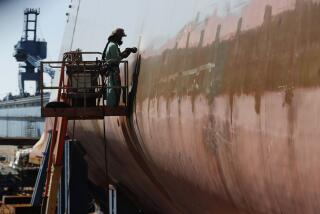Missile Defense Plan Rushed, Analyst Warns
- Share via
WASHINGTON — The Pentagon’s top weapon tester warned Monday that the Defense Department is moving too hastily toward a recommendation on whether the United States should deploy a national missile shield and urged his superiors to take more time.
Philip E. Coyle, director of operations and testing, said that, though the development program has been repeatedly delayed, Defense Secretary William S. Cohen is still scheduled to deliver his recommendation to President Clinton in June.
This timetable is putting “undue pressure” on the program’s managers “to meet an artificial decision point in the development process,” he said in an annual report to Congress and Cohen. And he warned that imposing such deadlines “has historically resulted in a negative effect on virtually every troubled DOD development program.”
Coyle urged that the deployment decision be put off until Pentagon officials have time to thoroughly study the results of the fifth flight test, a process that could take several months.
“This would provide a clear technical understanding of the results and avoid forcing the [decision] before the analysis is complete,” said Coyle, who functions as an independent judge of weapon programs.
Amid signs that the North Koreans, Iranians and other potential adversaries have stepped up development of long-range missiles, the United States has been racing to develop a system of interceptors that could knock down incoming warheads. U.S. officials have hoped to get a deployment decision from the White House this summer so a shield, if needed, could be ready for operation by 2005 or 2006.
Yet the development has been slowed by various complications, including the failure last month of a flight test in which an interceptor sought to knock down a dummy warhead as it streaked through outer space. The mishap has postponed the next flight test, probably until May.
With the deployment decision now due in the middle of the presidential election campaign, many analysts believe that it will be driven by whether the White House believes Vice President Al Gore, the Democratic front-runner, is vulnerable on the issue. The Republicans have been pushing hard for deployment, while the administration has been more cautious.
Foes of missile defense seized on Coyle’s comments as proof that the program is being driven by political pressures rather than a sensible development timetable.
Opponents have also argued that the snags in the development program show that the system is not ready for deployment and have urged Clinton to put off a decision. Recently some Republicans in Congress, including Sen. Chuck Hagel of Nebraska and Sen. Gordon Smith of Oregon, also have urged delay.
More to Read
Sign up for Essential California
The most important California stories and recommendations in your inbox every morning.
You may occasionally receive promotional content from the Los Angeles Times.














